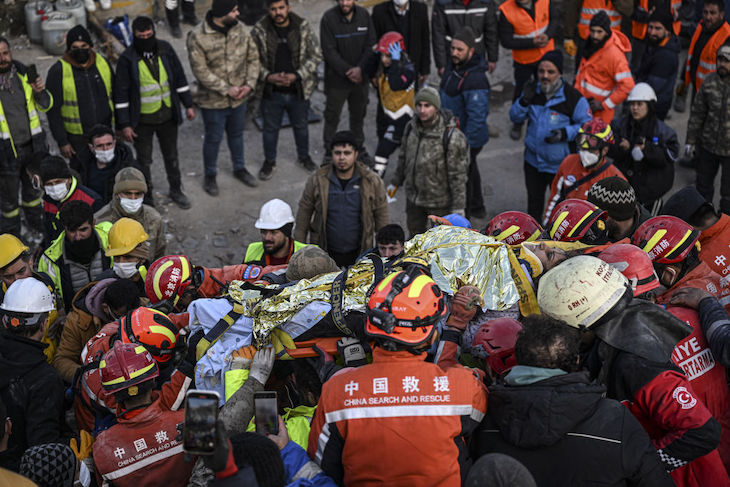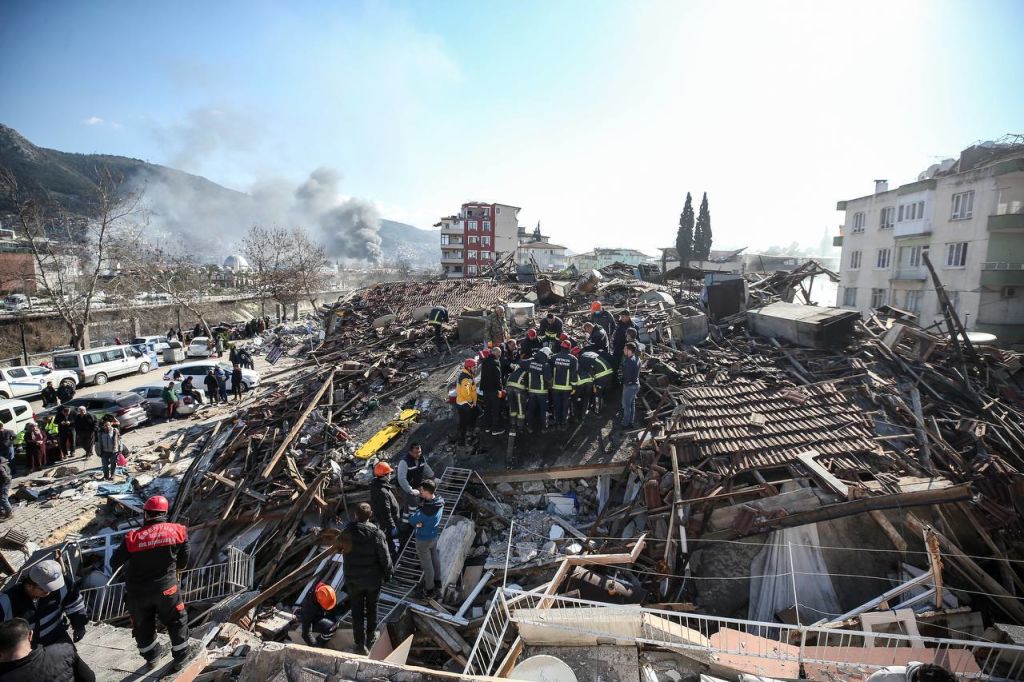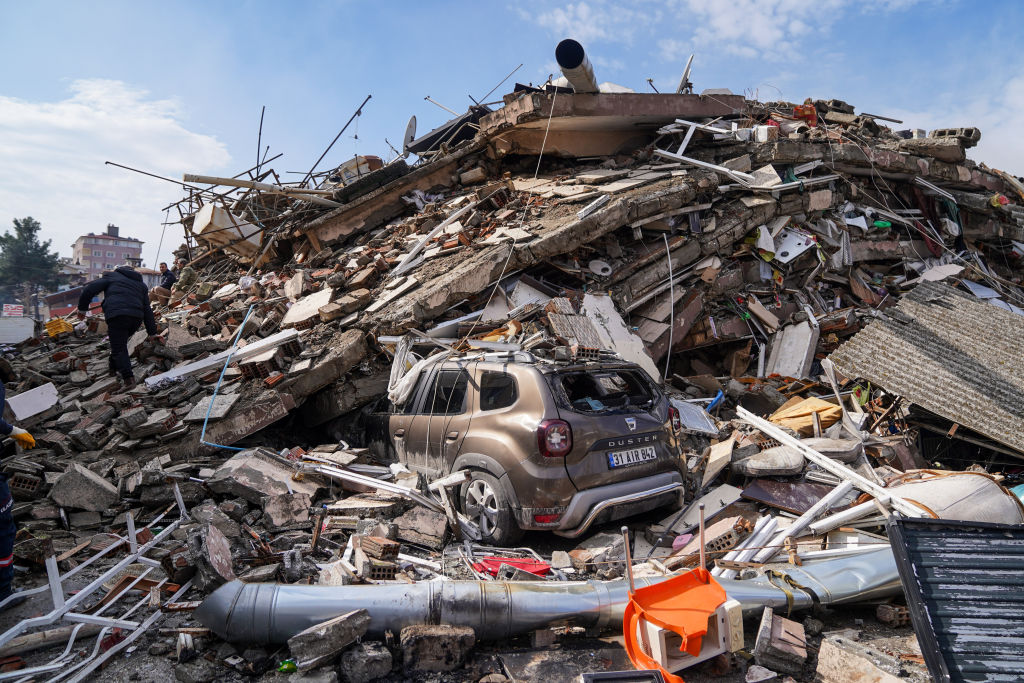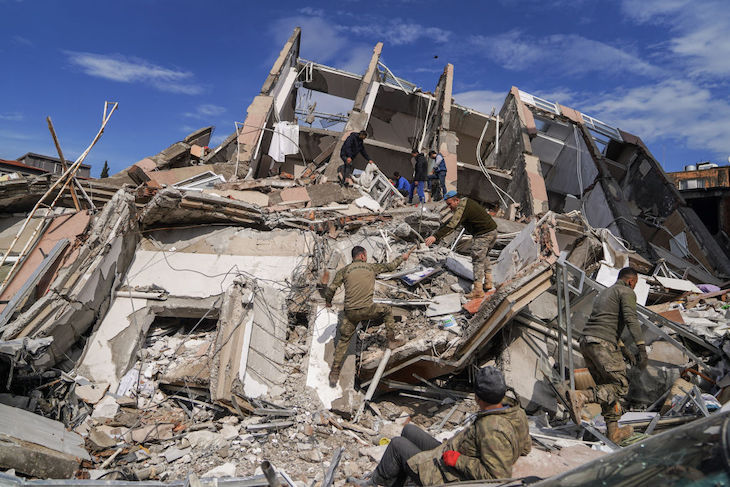Before Monday’s earthquake, the old town of Antakya, known historically as Antioch, had been a wonderfully preserved labyrinth of narrow cobbled streets on a gentle hill rising from the river. Beautiful houses with peaceful courtyards had been turned into restaurants and hotels, where people sipped tea and smoked under the shade of trees.
I had spent a couple of days in Idleb, northwest Syria, where I oversee operations as the country director for the HALO Trust, the landmine clearance organisation, and had decided to spend the weekend in Antakya before leaving for Gaziantep on the Turkish/Syrian border. That whimsical decision to stay in Antakya, and the choice to get up in the middle of the night for an early flight, were two of many factors that almost certainly saved my life.
I woke at 3.15am on Monday and made tea before my taxi arrived. It was raining torrentially, but the roads were empty. There was a lot of standing water and I felt the car aquaplaning now and then as we hit big puddles. The highway was very smooth, and the taxi was in good condition. So, it was peculiar when, for a few seconds, the car started wobbling.
Turks are chatty, sociable people. For hours, no-one said a word
Hatay is a small airport in open ground away from the town of Antakya. A single terminal building, modern with a high roof, and a small car park. I was one of the first to check in and go through to the departure lounge. From previous visits, I knew there were only a couple kiosks selling hot drinks but none was open, so I sat down in a seat next to the exit door. At that point, there were probably only half a dozen passengers in the departure lounge.
When the building started shaking, I looked at the woman opposite. Within a couple of seconds, the violence soared and her eyes filled with terror. In unison, we both got up. I grabbed my rucksack and we ran to the glass exit doors. They were two electric doors designed to open when a sensor is triggered. But the sensor was off and there were no staff there. We each grabbed one door and started pulling them apart. We managed to open them and I ran straight out to where the planes were parked. She must have run in another direction. Everyone else would have headed for the entrance on the other side of the building.

Two jets were parked with their noses pointing straight towards the terminal. I ran towards them, heading directly between them. By the time I was clear of the building, I was completely alone. It was pitch black, pouring with rain and completely silent. Then I stopped. The noses of the planes were rising up in unison, maybe twenty metres high.
In the darkness I could just about see that the wheels hadn’t left the ground. It was the ground that was moving and they looked like two boats riding a wave. It seemed that they had come alive and reared up like two enormous creatures. I thought that this utterly surreal vision was the last thing I would ever see; that the ripping ground would open up beneath me, and send me into the next world. After this crescendo of movement, they gracefully began to fall, and on reaching their original level they began toppling, dipping their wings before regaining balance.
I turned around and saw that the terminal was still standing. I don’t remember how I made it to the front of the building, but I found myself at the main entrance. The long, high, metal canopy that had covered the path from the drop-off parking to the entrance doors had completely collapsed. In the darkness, I could make out that a woman was trapped and screaming. I don’t know how many people were injured. Airport staff were trying to extract her and call for help. I tried to see if there was somewhere safe to take shelter from the pounding rain. I was in the car park and the ground was shifting. The streetlights had been knocked out and it was completely dark.
When the building started shaking, I looked at the woman opposite. Within a couple of seconds, her eyes filled with terror
All I could think of was to huddle beneath one of the small trees to get some shelter from the rain and away from any structure that might collapse. Ten years earlier, when I was in Somaliland, a colleague who had grown up during the civil war had told me about sheltering under a tree as government planes were dropping bombs on his village. At the time, I thought how utterly pathetic it sounded, the epitome of helplessness.
After a while, I made it to a small security hut where there were a few passengers and staff. I speak no Turkish, and no-one spoke English. We just stood there, in the rain and the dark.
I had managed to get a WhatsApp message to my colleagues in Amman, in Jordan, where I am based. I had seen a message from a Syrian colleague saying that a massive earthquake had hit Idleb, and the epicentre was in Gaziantep – nearly 120 miles east. I realised that the whole of southern Turkey must have been hit. If that was true, this was a total disaster.
Turks are chatty, sociable people. For hours, no-one said a word. They must have tried to contact relatives in Antakya, and either had no response, or heard initial reports of the nightmare that was unfolding there. The silence was awful. I was almost dreading daylight when we would see. Even though I was freezing cold, the darkness gave a sort of consolation.

Eventually, a single ambulance made it across the fractured car park to the collapsed terminal entrance. A JCB excavator turned up to start clearing the roads into the car park. A small bus arrived, big enough for the few dozen passengers to get on and keep warm. It was on the bus that I found someone who spoke enough English for me to ask about Antakya. ‘Very bad,’ she said.
I have spent years living and working in conflict zones and running large, complex mine clearance operations. Understanding risk and uncertainty, safety and security, is central to my job – trying to do dangerous things in lethal environments without my staff being killed or injured. Shortly after daybreak, I lost all communication with my teams in Syria and Jordan.
Everybody had just become a victim, effectively. The drivers of the bus, the ambulance and the JCB were all facing the appalling fact that their families may all be dead. Yet somehow they got on with their jobs. In doing so, they succeeded in getting us safely away from a location that might not be reached by anyone for days, because all resources would have been going to the town.
My taxi ride to the airport had taken less than half an hour. The return by bus took three times as long. The roads leading to the main highway were broken up. As it was open ground, the only things that could fall and block the route were streetlights, and the JCB managed to shove them out of the way. But fragments of the road surface, some several square metres in size were everywhere. It was one thing for the JCB to shift them; it was another to get the bus across each crack and crevice.
Back on the main highway into Antakya, the road was better, and some traffic was flowing. On the outskirts, most buildings were standing, though damaged. Some smaller, older structures had completely collapsed. As we approached the city centre, I noticed there was no power. No traffic signals, no lights in any apartments, no shop signs lit up. Traffic became heavier as we approached the river. Roads were blocked by the rubble from apartment buildings that had collapsed to the ground.
There were bodies under blankets. Children lying bleeding on the pavement
The bus could not take me back to the side of the river where the old town was, so I thanked them and got off. I stood in a street, trying to get my bearings. Nothing looked the same as before.
I went to a bridge I thought I recognised, and crossed over. I became aware of that mild but profound terror taking hold: not because of what I could see, but because of what I could not see. There were no ambulances, no police, no fire engines, no army trucks, no policemen, no soldiers, no medics. Almost six hours had passed and no relief had arrived. I knew this was because of the scale and complexity of the situation, so I am not being critical in saying that. Turkey is capable of responding to major emergencies, but the scale of this was completely overwhelming.
I tried many routes back to the hotel. I hoped that, being a low building higher up the hill, it might still be standing. It was a stupid thought, but there was nowhere else to go. What should have taken me fifteen minutes took about an hour and a half. Whole streets were annihilated. Clambering through collapsed buildings is a terrible idea, but there was no other way. Beds and carpets were sticking out from the rubble, all the mundane furniture of daily life were grotesque hints of what else lay underneath.
I finally found my hotel. The outer walls seemed intact, but the two entrances, one at the front, one at the side, were blocked with rubble almost to head height. The neighbouring buildings had all largely collapsed. The place was completely still and silent. I stood looking at the door for a moment. The property belonged to a nearby church, and had been rented by a young Turkish couple who ran it as a stylish guesthouse. She was a designer and had made the four or five bedrooms very beautiful. He was a logistics manager for an international NGO, which had operations in Syria.
I turned out of the cobbled street and back into the newer part of the neighbourhood. Since I had got off the bus, there hadn’t been any rain. Now, it started again. Heavily. I looked each way along the street. There were bodies under blankets. Children lying bleeding on the pavement. No water, and no medicines. People gathered around makeshift campfires. Not silence, but a lack of noise. It would take days for any machines to access this part of town to start moving rubble. It needed an army. It was clear to me that thousands of people had already been killed in the devastation that surrounded me.
As someone who works in the humanitarian sector, I have to deal as rationally as possible with the needs of people who find themselves in extreme situations. I realised I was about to become one of them. Then I met Augustin.
This young man pulling a suitcase was walking along the street. He clocked me and he said, ‘Are you a foreigner too?’
He seemed quite dazed, and said he was trying to remember the address of some distant relatives whose apartment blocks he thought might not have been badly hit. First, he wanted to go back to his guest house and collect some bags. I asked if I could go with him, as we might work better as a team.
As we walked, he told me he was a postgraduate student from Paris. He was French, with a rich heritage from this part of Asia, and he spoke good Turkish. He had been asleep when the quake hit, and must have been wandering around all morning. As I listened to him, I realised that, like a lot of people, his grasp of the situation was much poorer than mine. My journey back from the airport had allowed me to assess the state of the roads, the traffic, the impact of the damage all the way from the outskirts to the town centre. I was absolutely convinced that we had to do anything we could to get out as soon as possible. The prospect of staying was increasingly terrifying. Every minute closer to nightfall, the risks were increasing. I saw this as he led me back to his guest house. In a narrow alley, we ducked into a covered passageway and climbed over heaps of rubble, lumps of masonry dangling above our heads. Just doing this was ludicrously dangerous, and I doubted that the contents of his suitcase were worth the risk.

We made it to the courtyard and he gathered his belongings. It looked like it had been a two-storey building. He pointed to an upper room and said, ‘That was my bedroom.’ The roof had caved in but it was otherwise largely intact. It was unbelievable that he hadn’t been either trapped or unable to escape the courtyard.
We walked for about a half a mile, and found his relatives’ apartment block. Like every building that was standing, it was completely empty. Rubble in the stairways, cracks in the walls. Next door, there was a beauty salon with the front completely demolished. Two men were sitting inside. Augustin chatted to them for a while. I asked if there was a bathroom I could use. They gestured me to go further inside the building, I walked to the back of the shop and found a bathroom. The door was jammed. I carefully leaned on it and got it moving. I took the opportunity to use a toilet while there was still enough daylight to find one. With so many buildings destroyed or unsafe, the streets were likely to become open sewers within hours. Out of curiosity, I pressed the flush. As I did, my heart sank. If I had thought about it slightly more, I would have lifted the lid of the cistern to see if there was any water, and drunk it. I was almost relieved when it didn’t flush. Losing all that water because of a stupid mistake would have been demoralising. I checked the tap. Nothing. I was really starting to get worried about dehydration.
Whole streets were annihilated
I told Augustin that if we didn’t freeze to death overnight, we would be in such a state by the morning that we wouldn’t be able to do anything. There might be another quake. Whatever relief might come needed to go to the ones who really needed it. From bottles of water to tents to medical supplies and communications support. There were people here who couldn’t leave. Families trying to rescue trapped relatives. We couldn’t help them, but if we stayed, we might add to the burden.
We headed down towards the river towards a shopping centre where a major fire was taking hold. Thick smoke was filling the air, and similar blazes were visible in every direction across the city. Just then, a small bus drove past. The driver stopped and asked directions to a hotel. Augustin asked him if he could take us to Ankara. They talked, and then he drove off, stopping about fifty yards away. Augustin said that the bus was only for guests from a certain hotel. I told him firmly that if that bus was going to Ankara, we had to be on it. I had about $300 (£250) in various currencies and I wasn’t going to quibble about price. Augustin ran back to the bus. Yes, we could get on, if the hotel guests agreed and if there was enough space. We got a seat.
It was early afternoon and we were warm for the first time all day. I could barely believe our good fortune.
The broken roads on the way out were familiar to me. Stuck in traffic going into Antakya was a convoy of khaki-coloured civil defence ambulances, huge military-style off-roaders. This was the first sign I saw of concerted relief efforts, although it was a tiny fraction of what would be needed.
As we headed north, the damage generally lessened. More than an hour out of Antakya, still most buildings were damaged, some levelled. The coastal route hugged the hillsides around Iskenderun, where, as the sun was setting, we looked directly down at the container port which had a massive fire, like an oil refinery had been bombed.
By mid-afternoon, I had re-established communications with my office in Jordan. Incredibly, our Syrian colleagues were all unscathed, but I was deeply concerned about the coming days and nights. For years, millions of people in northwest Syria had effectively been supported by vast aid shipments from Gaziantep, in south east Turkey, which had just been destroyed. It would take weeks just to get basic supplies into the region in the massively increased volumes now needed. The elderly and vulnerable would be wiped out within hours, and there was nothing anyone could do about it.
North of Iskanderun, we were making good progress. Fortunately, we had a full tank of diesel, as there were typically queues of around 100 vehicles at the fuel stations that were open. We stopped a few times on the way for the driver to have a break. I went into the bathroom at one fuel station and there was blood everywhere, pools of it on the floor from casualties that people must have been evacuating in their own cars because there weren’t enough ambulances. The station shops were all nearly empty of drinks and food and they were running out of cigarettes.
As it became dark, the highway took us away from the towns into what seemed like wide open flatlands. I saw a layer of snow on the road and more was coming down. The blizzard became heavier. For a couple of hours, we didn’t get above 25mph.We passed an overturned bus covered with inches of snow, and surrounded by cars that had spun around it in a multi-vehicle crash.
The snow eventually eased and the roads improved. It was 3am when we got to Ankara. I was dropped off at a taxi stand. There was one taxi and a little hut. The lights were off. I knocked on the door. Through the window, I saw a man wake and get up from a sofa. He took me to a hotel near the airport. It was more than twenty-four hours since that first cup of tea.
I flew back to Jordan the next day. In the taxi on the way into Amman, the sensory overload from Monday was playing tricks on me. Because we had arrived in Ankara in the middle of the night, I could hardly see any buildings. The hotel I stayed in was a solitary high-rise block standing by itself on the road into the airport. Amman that day was the first time I’d seen a city since Antakya, and I couldn’t understand why the buildings were all intact. I found myself blinking over and over as if I hadn’t seen things properly. The image of wrecked buildings had registered so strongly that I was still imagining them.






Comments